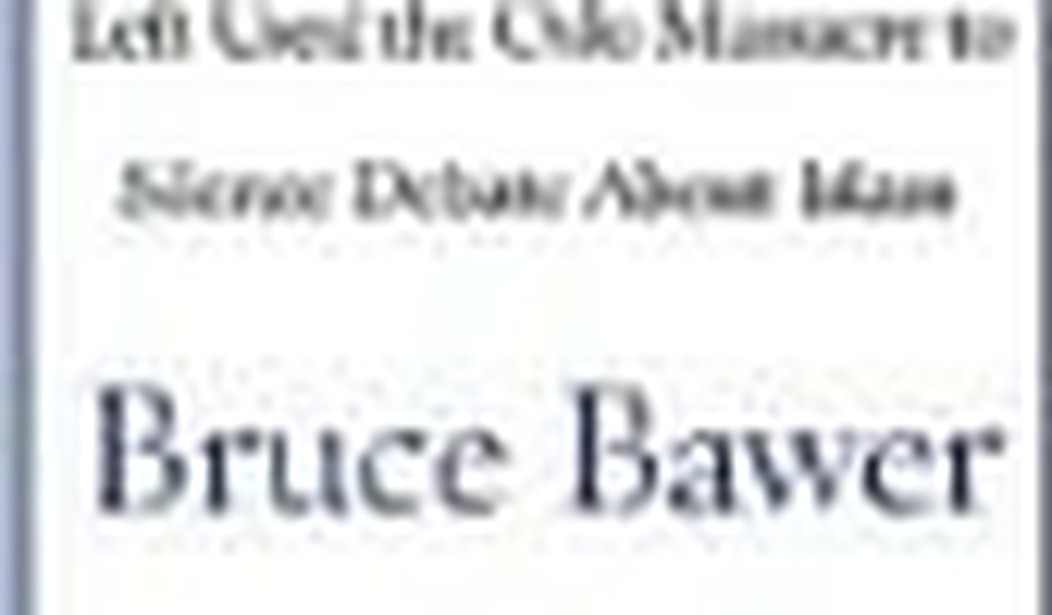—————————————–
It did not take long for Norway’s New Quislings to rally around a new label for their enemies: “Eurabia writers,” “Eurabia conspiracists,” “Eurabia propagandists,” or some variation thereupon. One of the first to employ this label was Sindre Bangstad, a social anthropologist at the University of Oslo, who in the Danish newspaper Politiken used Breivik’s atrocities as a club with which to beat a wide range of adversaries. He went, for example, after Walid al-Kubaisi, an Iraqi Norwegian writer whose website is called Opplyste Muslimer (Enlightened Muslims). Walid is one of the bravest people in Norway and one of its most fervent defenders of individual liberty—yet Bangstad smeared him as a “Eurabia literature propagandist” and mocked him for having assumed, in the first moments after the explosions in Oslo, that they were the work of Islamic terrorists.
What is “Eurabia”? The word refers to the book of that title by the scholar Bat Ye’or, who describes how various obscure European commissions, committees, and such have smoothed the way for the Islamization of Europe. Since July 22, the book Eurabia has repeatedly been characterized in the Norwegian media as pure fantasy; on the contrary, it is a sober work of solid documentation, and anyone who wishes to try to refute it should do so by resorting to facts, not by smearing it as baseless propaganda. Ye’or has studied a small library of obscure agreements produced by diplomat meetings, conferences, conventions, and the like over recent decades, and has found what she considers an unsettling pattern of “informal alliances” between European officials and their Mediterranean Arab counterparts that take place under the umbrella of something called the Euro-Arab Dialogue, which dates back to 1974. Bat Ye’or considers these alliances to be characterized by a European deference toward Muslim values, sensibilities, and sensitivities, a pattern she likens to the historical subordination of non-Muslims in Islamic countries. These agreements, in her view, have been instrumental in producing an increasingly Islamized Europe in which government leaders are quick to give way to Muslim wishes and demands and loath to defend Western values and principles—thus, Eurabia. Ye’or is no shrill self-promoter, and her books are hardly the punchy screeds they have been made out to be; on the contrary, they are dry, sober, and packed with long, thoroughly footnoted quotations. The serious and responsible way for an opponent to respond to such work is by challenging the facts or the interpretations thereof; it is not to name-call, to describe her as a street-corner hatemonger or a reckless peddler of baseless conspiracy theories.
Bangstad also went after the Progress Party and its former head, Carl I. Hagen: “We don’t know when Carl I. Hagen began to read the type of Eurabia literature that Anders Behring Breivik has also read, but it is well documented that he and several of his fellow party members have read precisely that type of literature.” As in any totalitarian society, it was now apparently an offense in Norway simply to have read certain books that the country’s new Public Enemy Number One had also read. (By the same logic—in fact by far better logic—one would expect that after 9/11, Madrid, London, Beslan, Bali, Mumbai, and so forth, it would be forbidden to read the Koran.)
Bangstad had more to say:
Anders Behring Breivik . . . has read widely in the racist and Islamophobic literature, from the Israeli right-wing extremist Bat Ye’or by way of the American-Norwegian neoconservative Bruce Bawer to the Norwegian professor emeritus in sociology Sigurd Skirbekk. . . . Hereafter it will be difficult for editors and intellectuals to minimize the existence of Islamophobia in Norway, and it will, if possible, be even more difficult to claim that racists’ and Islamophobes’ words are just words. . . . Anders Behring Breivik has, by his actions, set himself up against history. Multicultural Norway has come to stay. No pasaran—the line is drawn here.
Those last words, of course, were a quote from Che Guevara—which gave a helpful hint as to exactly where, ideologically, these nasty lucubrations had their origin. (Though it should have been No pasarán, with an accent over the third a.)
Late August saw the publication of more thorough, sustained attacks on the critics of Islam and of multiculturalism—attacks that had obviously been in the works for some time. They reached new level of propagandistic poison. The malice and mendacity were palpable; it was now no longer disputable that the New Quislings were out to destroy—nothing less. By now it was also clear that many of them considered the “Eurabia” line of attack a winner.
On August 19, the Norwegian weekly Morgenbladet ran a long, mischievous article by Maren Næss Olsen and Anders B. Bisgaard titled “The Eurabian Verses.” It was yet another attempt to link critics of Islam with Breivik—and yet another in a years-long list of attempts by left-wing journalists across the Western world to dismiss concerns about the Islamization of Europe as the product of misinformation by a few nutty extremists. Indeed, even given the ostrich-like attitude of the Western mass media generally toward the darker facts about Islam, Olsen and Bisgaard’s article was well-nigh breathtaking in its utter refusal to acknowledge basic realities about the world we live in.
According to the tale spun by Olsen and Bisgaard, pretty much all of Islam criticism, it seems, can be traced to the work of one whacked-out lady, and then, in turn, to the work of another whacked-out lady. “The mass murderer Anders Behring Breivik, the blogger Fjordman, the Dutch politician Geert Wilders, the Oslo-based author Bruce Bawer, the Libyan dictator Muammar al-Gaddafi, and [Norwegian] Conservative Party veteran Hallgrim Berg,” the Morgenbladet authors wrote, “are among those who have embraced all or parts of Bat Ye’or’s imaginative Eurabia universe, which in turn is built on the thoughts of the Italian journalist and author Oriana Fallaci. Ye’or’s book, in time, has in time spawned an entire genre, with titles like Londonistan, The Last Days of Europe, Defeating Eurabia, and While Europe Slept.”
Olsen and Bisgaard called me, Wilders, Ye’or, Berg, Walter Laqueur, Melanie Phillips, and other critics of Islam “conspiracy theorists.” But it was Olsen and Bisgaard’s article that was framing a conspiracy theory. For their whole agenda was to dismiss all concerns about the Islamization of Europe as the product of a cultish conspiracy by us, a group of loony right-wing bigots who are the disciples of a lone crackpot and whose views have gained no traction whatsoever among academic “experts” in Islam and immigration—but who, for some mysterious reason, have managed to convince millions of readers that there is something to what we say.
Click here to order.









Join the conversation as a VIP Member